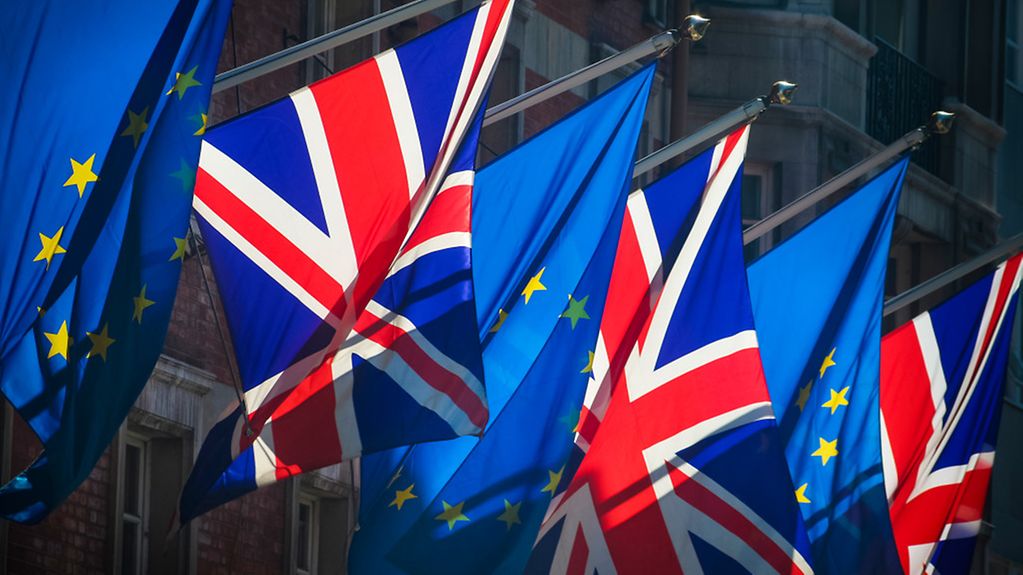UK withdrawal from the EU
The EU states have agreed to extend the deadline for the UK’s withdrawal to the end of January 2020. If the withdrawal agreement is ratified before this date, the UK can leave earlier, announced Donald Tusk, President of the European Council.
3 min reading time

The German government has taken precautions in case of a no-deal Brexit
Photo: Colourbox
The German government welcomes the decision to extend Article 50 again. It is a good solution, said federal government spokesperson Steffen Seibert in Berlin. The ball is now in the UK’s court. It is important to make productive use of the additional time.
On 19 October, Prime Minister Boris Johnson sent a letter requesting an extension until the end of January 2020. European Council President Donald Tusk recommended that the remaining 27 states approve the request to prevent a no-deal Brexit on 31 October.
New Brexit agreement negotiated
Shortly before the meeting of the European Council in mid-October Boris Johnson negotiated a modified withdrawal agreement. The issue of how to ensure the border between EU member state Ireland and Northern Ireland, which is part of the UK, remains open following Brexit was re-addressed. Boris Johnson also agreed on a political declaration with Brussels, which is intended to see a free trade agreement between the EU and the UK by the end of 2020.
On 17 October the European Council approved the modified agreement. The UK House of Commons and the European Parliament still need to pass it before it can come into effect.
Preserving the single market, upholding the Good Friday Agreement
At the European Council meeting Chancellor Angela Merkel said that the new agreement opens up the opportunity ""to retain good, close relations with the United Kingdom in future, both in economic terms and in the foreign and security policy field". Essential preconditions have been met. The integrity of the EU’s single market is ensured, and border checks between Northern Ireland and the Republic of Ireland avoided, while the Good Friday Agreement will be upheld.
On 10 April 2019 the European Council decided unanimously to extend Article 50, delaying the UK’s withdrawal until 31 October 2019. By further extending the deadline the EU has given the UK more time to achieve clarity at domestic level on the major questions involved in passing the withdrawal agreement, and the shape of the future relationship. You can find out more here.
What will happen in the case of an orderly withdrawal?
If the withdrawal agreement is ratified, a transition period will apply until 31 December 2020. On 17 January 2019, the German Bundestag approved a government bill that regulates this transition period. It has two main elements:
Essentially, under German law the United Kingdom will continue to be treated like an EU member state during the transition period. The citizenship regulations will also remain unchanged until the end of 2020: British citizens applying for German citizenship during this period will be entitled to retain their British passport, and vice versa – even if a final decision on the application is not taken until after the end of the transition period.
The transition period is intended to give businesses and authorities a chance to prepare for Brexit. For this period EU law is to continue to apply to the United Kingdom. The time is to be used to agree on the future relationship between the UK and the EU.
What does a disorderly withdrawal, or no-deal Brexit mean?
If there is no agreement, the United Kingdom will automatically cease to be a member of the European Union. As of the exit date, the UK would become a third state and the body of EU laws and regulations (known as the "acquis communautaire") would cease to apply to the UK. This would have far-reaching consequences for individuals, business and public authorities.
German government takes precautions
The German government has taken extensive steps to prepare for every possible scenario, irrespective of how and when the United Kingdom leaves the European Union.
In Germany several acts of parliament have been passed dealing with individual aspects of Brexit. The website of the German government provides information on all relevant aspects of Brexit.
You will find more information here.
The German government has coordinated all precautionary activities with its European partners and the European Commission.